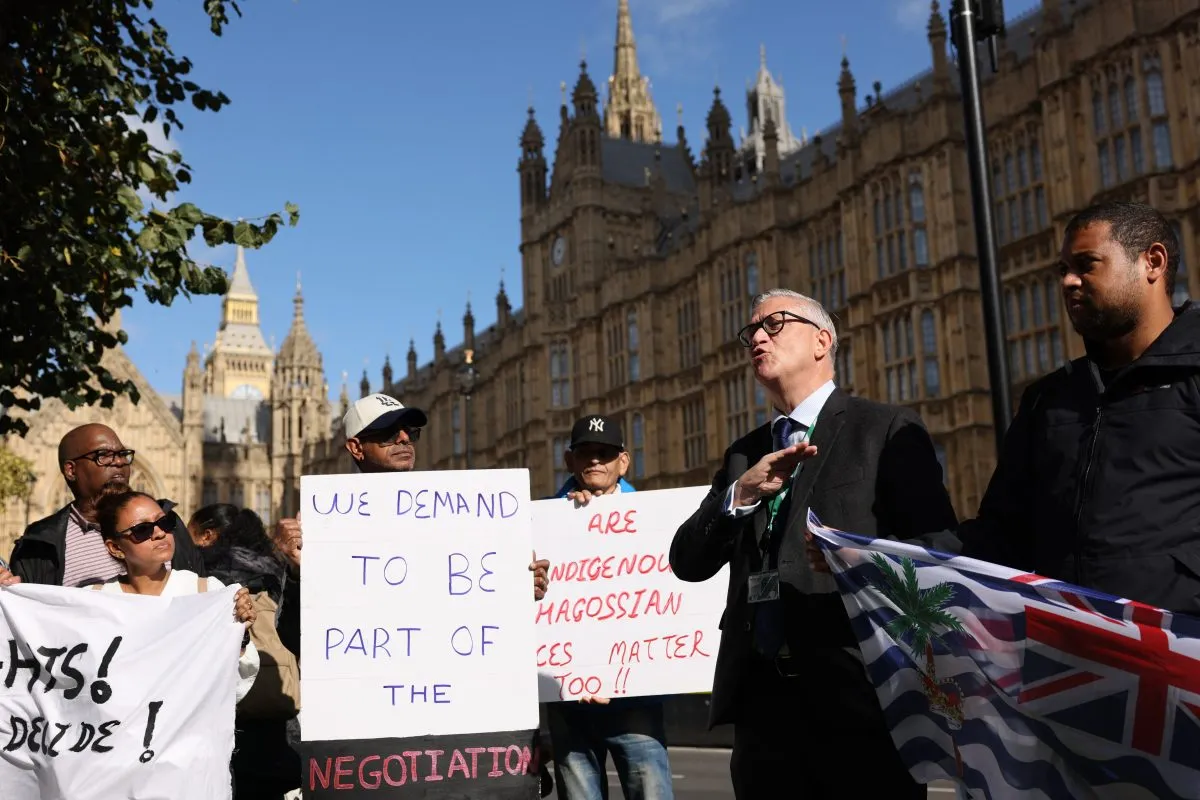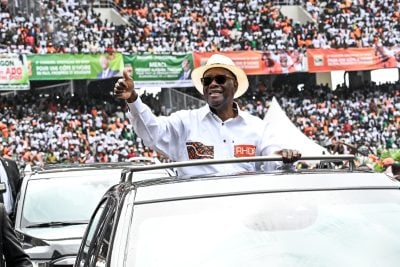As the transition unfolded between the Biden administration and the second Trump administration, the sovereignty and control of the Chagos Archipelago, also known as the British Indian Ocean Territory (BIOT), has emerged as a focal point in the evolving relationship between the UK and US.
Central to this issue is Diego Garcia, a 17-square-mile horseshoe-shaped atoll and the largest and southernmost island in the archipelago, which hosts a strategically important UK-US military base that serves as a crucial hub for US military operations in the Middle East, intelligence gathering and global communications networks.
Under British control since the Treaty of Paris in 1814, the archipelago remained a UK territory through the era of decolonisation.
The islands, however, carry a dark history: from 1968 and 1973, between 1500 and 1800 islanders – descendants of enslaved people from Mozambique and Madagascar and indentured labourers from India – were forcibly removed by the UK. Most were relocated to Mauritius – with whom the Chagos Islands shared a colonial administrative unit – where they were left destitute at the Port Louis dockside.
In recent years, legal and political momentum has gathered behind Mauritius’ claims to the islands, which is rooted in their shared colonial administration.
After years of legal challenges, the UK’s Labour government agreed on 3 October to transfer sovereignty of the islands to Mauritius, subject to the finalisation of a treaty between the parties, negotiations on which began in November 2022 under the government of Rishi Sunak. The proposed deal was announced in a joint statement by UK Prime Minister Keir Starmer and then Mauritius Prime Minister Pravind Jugnauth and supported by the Biden administration.
But finalisation of the deal has been far from simple. Soon after the deal’s announcement, Jugnauth was replaced in a landslide election by Navin Ramgoolam, who has proved much more sceptical on the deal as originally outlined.
He has reportedly pushed for billions of dollars in payments for the UK’s ongoing use of the military base once Mauritian sovereignty of the islands is secured, and is said to be playing hardball over the length of the base’s lease.
US concerns
Ramgoolam’s more combative approach to negotiations has sparked concerns in both London and Washington DC, where the Trump administration is much more sceptical of the handover.
Even before Trump entered the White House for a second time, Republican senator Marco Rubio – now US secretary of state – expressed concern, arguing that the deal posed a serious threat to US national security.
The original proposal included a lease arrangement for the military base for an initial 99 years – seen by sceptics as a relatively short time in geopolitical terms. Reports have suggested that Ramgoolam is pushing for a shorter agreement still.
Trump advisers have also been alarmed about the strong trade and socio-political ties between Port Louis and Beijing, arguing that these could pave the way to allow China to use fishing vessels – or other means – to spy on the US base or even to establish its own base on one of the outer islands.
Concerns have also been raised that returning the Chagos Islands to Mauritius would compromise the storage of US nuclear weapons, as a Mauritian-owned Diego Garcia would unambiguously fall under the African nuclear-free zone established by the 1996 Treaty of Pelindaba. This treaty prohibits the development, possession or stationing of nuclear weapons in signatory states.
These concerns arise at a time of heightened international tensions between China and the US, the plethora of problems in the Middle East, and the war between Russia and Ukraine. Additionally, while Somali piracy in the Indian Ocean has declined in recent years, broader maritime security concerns, particularly about the protection of the sea lanes connecting Africa to Asia, persist.
UK reaction
While concerns in Washington DC have mounted, opposition has also been building in the UK.
British newspapers including The Daily Telegraph, The Times, Daily Mail and The Spectator have all savaged the deal. The Times accused Starmer and his foreign secretary David Lammy of “strategic illiteracy” in a strongly-worded editorial railing against the logic of the deal.
Political opposition to the deal is also being brought to bear. In Parliament on 5 February Conservative opposition leader Kemi Badenoch called the deal “an immoral surrender so north London lawyers can boast at their dinner parties”.
Their concerns focus on the costs of the deal, the security implications of the handover, and the impact on relations with the Trump administration.
Continued sovereignty of BIOT, they point out, could be used as a bargaining chip to secure a favourable US-UK free trade agreement with Trump back in the Oval Office.
By contrast, Starmer says that the deal is essential to securing ongoing UK access to the base.
“Let me be clear, and I’ll pick my words carefully: without legal certainty, the base cannot operate in practical terms as it should. That is bad for our national security and it’s a gift to our adversaries,” he told Parliament.
A former lawyer, Starmer’s decision to pursue the handover is also rooted in his respect for a string of legal decisions – notably an advisory judgment by the International Court of Justice in 2019 – that says the UK must end its administration of the islands.
It has also been suggested that a successful handover to Mauritius could boost the UK’s broader geo-economic ties with Africa. Mauritius has long positioned itself as a gateway between Asia and Africa, actively leveraging the role for economic growth and regional influence. As a member of the African Union (AU), the country has long garnered strong political support from fellow members for its sovereignty claim to the Chagos Archipelago.
Chagossians conflicted
Meanwhile, Chagossians themselves hold conflicting opinions on the proposed handover.
Some 3000 second- and third-generation UK-based Chagossians hold British citizenship. The Chagossian Voices campaign group, which claims to represent them, argues that, as with much of their history, they have not been consulted and say they do not trust the political and business elite in Mauritius to act in their best interests.
They want the archipelago to remain under British control, and are engaged in demonstrations and legal challenges to prevent the handover.
By contrast, many of the 350 or so surviving first-generation Chagossians in Mauritius, who are entitled to British citizenship and are members of the Chagos Refugee Group (CRG) led by 60-year-old electrician Olivier Bancoult, aspire to return to their homeland for their final years. This could become a reality if the treaty between the UK and Mauritius is enacted.
Under the terms of the UK-Mauritius treaty, Chagossians would be permitted to return to the outer islands but not to Diego Garcia itself. This is a significant complication, as approximately two-thirds of the exiled population originate from the island and consider it their ancestral home.
Bancoult has also argued that there is no reason why Chagossians could not co-exist with the US military by living on the uninhabited eastern side of Diego Garcia. He suggests that young Mauritian-based Chagossians could work on the base, replacing the current Filipino, Indian and other civilian contractors. He has claimed that this could serve as a form of reparation for the shameful and unnecessary suffering endured by their ancestors.
Ramgoolam’s demands
With the clock ticking in the run-up to Trump assuming the presidency, most observers had expected new Mauritian PM Ramgoolam to quickly secure a deal with the UK. However, Ramgoolam has been alert to the economic potential of any deal and continued to push for the UK to improve its terms.
While currently experiencing growth of around 4.4%, Mauritius was deeply affected by the Covid-19 pandemic, particularly its vital tourist sector, a major source of foreign exchange. Subsequent global shocks have further strained Mauritius’ open, import-dependent economy, contributing to the rupee’s depreciation, rising inflation and a cost-of-living crisis.
If reports are accurate that Ramgoolam is pushing for annual payments of $110m from the UK to Mauritius, with a portion to be frontloaded, the deal could benefit the Mauritian economy to the tune of billions of dollars.
Meanwhile, Ramgoolam has also sought to dispel US concerns about China’s influence on Mauritius.
While China and Mauritius share strong economic ties – including a free trade agreement signed in 2019 and implemented in 2021, the first of its kind with an African country – Mauritius is not part of Beijing’s Belt and Road Initiative.
The wily veteran Ramgoolam, now serving his third term in office, is facing the complex challenge of balancing competing priorities: honouring campaign promises, securing short- and long-term economic benefits for Mauritius, addressing the Chagossians’ right of return, and the strategic interests of powerful nations, especially the US.
He has, however, already made it clear that even if Trump vetoes the treaty between Mauritius and the UK, he expects Starmer to end the sovereignty dispute once and for all.
Speaking to the Mauritian national assembly on 4 February, Ramgoolam said:
“The British prime minister informed me that he intends to push ahead with the agreement reached between Mauritius and the United Kingdom on the Chagos archipelago. We remain confident that it will reach a speedy resolution in the coming weeks.”
With Mauritius Independence Day looming on 12 March, Ramgoolam will be hoping to celebrate with a deal that gives Mauritius sovereignty of the islands, decision-making powers over the future of the base, and billions of dollars in payments.
Want to continue reading? Subscribe today.
You've read all your free articles for this month! Subscribe now to enjoy full access to our content.
Digital Monthly
£8.00 / month
Receive full unlimited access to our articles, opinions, podcasts and more.
Digital Yearly
£70.00 / year
Our best value offer - save £26 and gain access to all of our digital content for an entire year!
 Sign in with Google
Sign in with Google 



